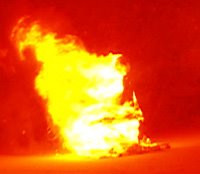Scott and I were watching a show a couple nights ago about how to survive disasters. A psychologist explained that if you look out the window of the jet you're on and see the engine on fire, your brain immediately goes back through all your memories, all your stored information, and tries to find a matching reference. (Hmmm, where did I put that file about the shit hitting the fan?...)
When your brain finds no reference and therefore cannot find an appropriate response to the present situation, it goes down one of two roads: panic or productive thought. You can probably guess which one is more helpful.
Of course you may be thinking "If the engine of my plane is a fury of blazing fire, and we're hurtling toward earth, what difference does it make if I panic or stay calm? I'm toast either way."
Apparently it does make a difference. If you, for example, spend that horrifying rapid descent toward earth focusing on how many seats are between you and the emergency exit, you'll have a better chance of saving your own life (if it's still intact) after impact. This way, when the cabin fills with black smoke and you're instantly blinded and struggling for breath, you can feel your way past the 7 rows to the exit, and push the panicked guy out of the way to open the emergency door yourself. You can reject panic and fight for your survival.
During the many hours I spent with my dad in the nursing home in Indiana, the emotional impact was staggering. But since I've come home and have a little distance, I realize how many times my own brain was fluttering through its files, trying to find something to draw upon.
I've seen documentaries about elderly family members with dementia, one in which a daughter is saying, in a loud voice for her hearing impaired father, "NO. I'm not your wife. I'm your DAUGHTER." I remember thinking how devastating it would be, to no longer be "known" by your parent. How could anyone bear that? Seeing their dad so lost.
Dad still knows me, sometimes. It was less solid on this last trip. And when he asked me, several times, "Are you my sister?" and "Am I your older brother?" and "Are you my mother?" it was not so much devastating as it was other things.
First, there was the brain-search.
I don't think he's ever thought I was his sister. Where did this come from? I know Aunt Frances used to say that I look like his little sister, who died when she was 12.
There was the shock.
How did we get to this place? How can it be that I'm middle-aged, and my dad is in a nursing home? Where did life go? How can we get through this?
The shock kept coming. I felt like a cliche. Like one of those people on the local news whose house has just been flattened by a tornado. They say "You never think this can happen to you."
The uncharted territory made it so hard to soak in the reality, that my emotions would turn off and on abruptly.
When I got back to Phoenix, I'd be doing something mundane like the dishes, and would suddenly go hold onto Scott and say, stunned, "My dad is in a nursing home." Like I'd just found out.
And when I think about what my mom is dealing with, the way her brain is scrambling to find some context, driving home exhausted to a silent house, that's when I'm back on the plane, trying to keep track of the number of rows to the exit. I keep losing count.






